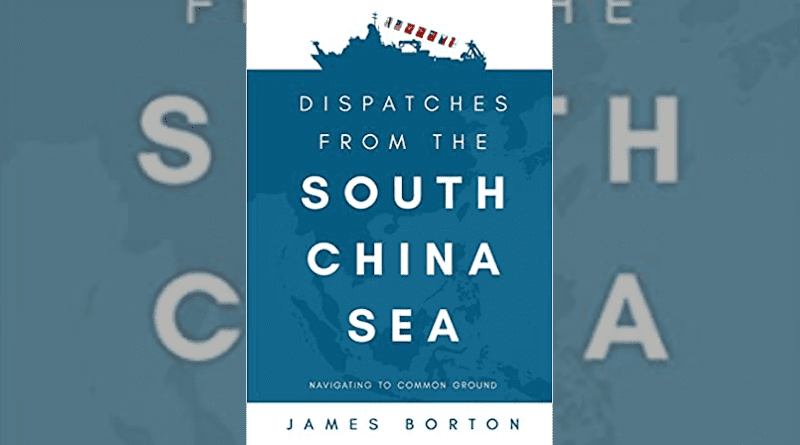US-Asia Institute Interviews Prof. James Borton
By Peter Tase
On March 11, 2022, the US – Asia Institute organized a podcast with Prof. James Borton, a veteran journalist and author on Southeast Asia. Borton has reported widely for outlets such as The Washington Times and The Diplomat, focusing on environmental security issues stretching from the Philippines, Micronesia and Vietnam, especially on the Mekong River and the South China Sea.
The following is a brief excerpt of Prof. Borton’s conversation with the two moderators of U. S. – Asia Institute, Lai Yu (Program Associate) and Kelly Tang (Program Assistant).
In this episode, Mr. Borton speaks about the regional maritime conflict in Southeast Asia as well as his latest book, “Dispatches from the South China Sea: Navigating to Common Ground,” in which he uses field notes, knowledge of ecological politics and the idea of science diplomacy, to explore ways in which to build up relationships in the region and solve the environmental damage to the endangered coral reefs of the region.
“For nearly thirty years my focus has been in southeast Asia, addressing the intersection of science and policy as it pertains to water governance particularly in the Mekong river and South China Sea. The friendships that I have developed regionally have been based in Vietnam. I have reached out to marine scientists but also to reporters and journalists whom I have known for over thirty years.
“Science driven policy solutions are the limelight of my book. We are at a tipping point in the conservation and the sustainability of our oceans. This is particularly evident in the South China Sea where there is over-fishing, illegal unreported fishing, or oil and gas resource exploitation. Other salient concerns are the death of coral reef ecosystems, island building reclamations, Ocean Acidification and plastics.
“Evidence based solutions are needed for a way to address these ocean based problems in order to better manage a rapidly changing ocean. Furthermore, climate change is real, and the warming of the ocean’s temperature is affecting all marine life; since it reduces the oxygen levels needed by fish. A particular concern is the local South China Sea fisheries. It is estimated that it generates food for over six hundred million people that need food supplies. This sector generates about 100 Billion USD per year and supports around 3.8 million people engaged in the industry. If there is no one looking at the science data, there is a strong possibility of a complete collapse of the fisheries; leading to a looming food security problem. And that will only raise the tensions and create social and political instability in the region. That is why we need cooperation among those claimant nations to bring scientists and oceanographers to offer solutions for the protection of that marine environment and living resources.
“I came in Vietnam in 1997 to witness the nation’s renovation, economic reforms that were taking place. And especially I wanted to witness what was the impact of internet on that particular country. I was invited by a gentleman who was sort of the internet founder for Vietnam, the founder of: Vietnam.net; a very successful online publication. And he introduced me to his bilingual young staff, must have been two hundred young Vietnamese, most of them women, and they all expressed a great interest in learning more about American reporting or western reporting practices. What was revealing to me was that this generation wanted to consume news online and the government was ill prepared to rival social media and its impact on these millennials.
“It really prompted in me a sense of arising optimism associated with openness in Vietnam. I really wanted to convey these trends to a western reader. It is significant to focus on this for a moment because in a country of 98 million people half of them are under the age of thirty-five years and they all have their smartphones now and the internet is everything to them.
So there is a sense of opening up to globalization so I was able to interview in that country the entrepreneurs who were changing the dynamics of Vietnam and was also meeting with the Vietnamese community members that were returning to their motherland bringing capital, new ideas, so we have this convergence and was a very good convergence of the technology that was brought along with the capital to start new businesses.
What is compelling is that you realize in three decades that Vietnam transformed itself from one of the poorest countries in the world and became a developing success story and that is what I really wanted to chronicle from my many new friends that are reporters and writers in Hanoi…”
“During my interviews I have met with the fishermen and the marine scientists. The alarming news was that there was a decline, a rapid decline in the fish stocks. The marine biologist, my other new friends and reporters said there are many challenges out there in the east Sea and one of them of course was that Chinese fishing trawlers were in great abundance and also creating some problems for the local Vietnamese. So, we discussed with two local marine scientists about the future steps Vietnam was taking to make sure that there was a conservation and sustainability practice and among those steps was the introduction of what we were doing for the marine protected area. …”
To listen to the full interview podcast with Prof. Borton, please visit this page:
Founded in 1979 by Esther G. Kee and Joji Konoshima, the US-Asia Institute is a private, United Nations-associated nongovernmental organization (NGO). It is a 501 (c) (3) nonprofit devoted to improving understanding and strengthening ties between the people and governments of the United States and Asia. USAI is a nonpartisan, non-advocacy organization with no policy agenda. The US-Asia Institute works directly with 15 countries: Brunei, Cambodia, China, India, Indonesia, Japan, Laos, Malaysia, Mongolia, Myanmar, Philippines, Singapore, South Korea, Thailand, and Vietnam.
https://www.usasiainstitute.org/

